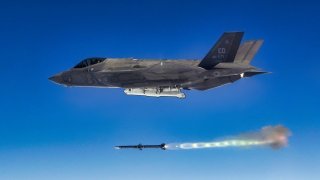Mary Beth Long

To almost everyone only a short while ago, the Houthis of Yemen were considered a violent political and military group with strong tribal underpinnings, comprised mainly of Shia Islamists opposed to the ruling class. The insurgency was not considered a particularly sophisticated military menace, although it did present a danger to Yemen’s legitimate government and its neighbors, especially Saudi Arabia.
Few would have listed the Houthis as a threat to global concerns, even taking into consideration the increasing evidence of Iranian military cooperation with the insurgents.
After October 7, everything changed. The Houthis are now a serious threat to the global economy, and it’s unclear what can be done to stop them.
What happened? Initially, the Houthis used Israel’s response to Hamas and sympathy for Palestinians as a welcomed excuse for attacks on civilian vessels transiting the Red Sea, which hosts over 12 percent of global trade and 30 percent of container traffic. The ongoing assaults against vessels, many of which have no clear linkage to Israel, have forced shippers to take alternative routes and some producers to suspend production to avoid goods getting stuck at sea or incurring exorbitant additional fuel and insurance costs.
In addition, the Houthis now launch daily drone and missile attacks against some of the most sophisticated military assets a coalition of Western and regional countries has to offer. In response, the United States and the United Kingdom recently conducted a third round of joint strikes on thirty-six targets in thirteen locations, followed by a series of U.S. strikes on five Houthi missiles targeting Red Sea traffic. Even the European Union has become involved. Last week, the German frigate Hessen began positioning itself to defend cargo passing through the Red Sea.
But despite the deployment of some of the world’s most advanced maritime weaponry, there appears to be very little the West and others can do about the Houthi campaign.
Some fear military escalation against the Yemen rebels will widen the Gaza conflict or play into the hands of Iran, which benefits greatly from using the Houthis and others in its campaign to eject the American presence in the region. Others hope that increasing strikes against Houthi military positions and intercept of inbound weaponry will deter the rebels and enable coalition forces to secure vital international waters, which, at least for the short term, appears unlikely.
Nor is the current plan—even if it works—a long-term solution. While the military response thus far may have somewhat degraded Houthi capabilities, the disproportionate cost to maritime coalition members of deploying advanced ships, planes, and other assets—not to mention the cost of expended ammunition and personnel costs—simply cannot compare to the relatively modest economics imposed upon the Houthis for their assaults. The U.S. and others can no longer ignore the urgent need for enhanced military presence elsewhere.
For their part, the Houthis have a lot to gain and little to lose from their maritime operations.
So, what should be done?
Successive U.S. administrations have consistently underestimated Tehran’s mullahs’ determination. Instead, they have treated Iran’s multifront, low-grade war as a series of disconnected, increasing sophistication assaults, and not the deliberate use of global proxies with deadly consequences that it is. We need a more aggressive, comprehensive policy to deter Iran and stop offering concessions for little or nothing in return. In addition, Washington has failed to address—not to mention confront—the expansion of Iranian influence into Central Asia, Africa, and South America.
We also must adopt the clear message that actions have consequences. Thus far, Iran has suffered little or no enduring repercussions for its decades-long assaults against Americans. Comprehensive consequences should include a long overdue, full-court press on Iranian malign activities in the region and elsewhere, with immediate and decisive retaliation when it attempts to stray. The measures should extend beyond military retaliation to include diplomatic and economic actions, like closing the gaps in the current woefully inadequate sanctions regime. Enforcing consequences on Iran—especially those that might threaten its supply of oil to China—could persuade a reexamination of its Yemen efforts.
As for the Houthis, without help from Iran, the rebels’ military reach could be limited. And while the current Red Sea conflict may have strengthened the insurgents’ international standing and public profile, they remain deeply vulnerable at home.
Finally, Yemen’s militants have nothing to offer Iran’s allies like Russia, Syria, Libya, China, and North Korea. None of these has any interest in paying a public price for supporting a global supply chain breakdown due to Iran’s continued impeding of the Red Sea through the Yemeni rebels. At a minimum, pressure on Iran to withdraw all its personnel and support to the insurgents could be a start. Left alone, even with transferred technology and know-how, the Houthis would likely be hard-pressed to continue their current pace of air assaults, and that may allow at least some measure of security to be restored.
No comments:
Post a Comment